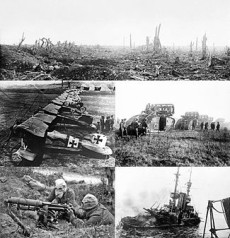A Hundred Years of WarBy Anthony Gregory, The BeaconJul. 29, 2014 |
Popular 
U.S. Official Denies Report Trump Team Told Israel 'We Will Abandon You' If You Don't End Gaza War

Ben Shapiro, Mark Levin and Laura Loomer Warn of Foreign Influence... From Qatar

Eloy Adrian Camarillo, 17, Arrested in Shooting Death of Infowars Reporter Jamie White

Report: Hamas Says Witkoff Promised to Lift Gaza Blockade in Exchange for Edan Alexander

NYT: Trump Ended War With Houthis After They Shot Down U.S. Drones, Nearly Hit Fighter Jets
  One hundred years ago today, Austria-Hungary fired the first shots of World War I, sparking its conflict with Serbia. Gavrilo Princip, a Bosnian Serb, had assassinated Archduke Franz Ferdinand. Mutual defense agreements ensured that the political clash did not remain regional. Austria-Hungary got support from Germany, the Ottoman Empire, and Bulgaria. Serbia found allies in Britain, France, Belgium, Greece, Romania, Italy, Russia, Portugal, Montenegro, Japan, Brazil and the United States. The global war likely qualified as the worst bloodbath the world had yet to see, certainly in such a short duration. Fifteen million or more died in less than five years. Tens of millions were wounded, displaced, or orphaned. Disease spread. The international trade and exchange that existed before the war never fully recovered. One hundred years ago today, Austria-Hungary fired the first shots of World War I, sparking its conflict with Serbia. Gavrilo Princip, a Bosnian Serb, had assassinated Archduke Franz Ferdinand. Mutual defense agreements ensured that the political clash did not remain regional. Austria-Hungary got support from Germany, the Ottoman Empire, and Bulgaria. Serbia found allies in Britain, France, Belgium, Greece, Romania, Italy, Russia, Portugal, Montenegro, Japan, Brazil and the United States. The global war likely qualified as the worst bloodbath the world had yet to see, certainly in such a short duration. Fifteen million or more died in less than five years. Tens of millions were wounded, displaced, or orphaned. Disease spread. The international trade and exchange that existed before the war never fully recovered.World War I was a low point for liberties within the United States, once America finally got engaged in the battle. People went to prison for criticizing the military or opposing the draft. Surveillance of the citizenry and crackdowns on dissent became normal. Domestic regulation and taxation skyrocketed. Almost nothing that happened during the New Deal did not have some precursor in Wilson’s wartime domestic governance. There was hope for the United States becoming freer and freer in the early 20th century. World War I altered that picture dramatically. Almost everything the federal government has done in the last century has roots in the 1910s. For the West and the rest of the world, World War I was in a sense the worst tragedy of all time. World War II was bigger and badder, but had distinct causes in the First World War and its aftermath. During the war, both the Allies and Central Powers committed horrific atrocities. The Germans conducted ghastly submarine warfare. The British starved German civilians. Chemical weapons and trench fighting took the lives of millions in totally pointless battles over useless stretches of territory. When the United States finally mobilized fully for war, the effort was sold as a way to save democracy and end war for all time. Out of the ashes of World War I emerged not peace and liberty, but reaction and totalitarianism. Communism took root in Eastern Europe. Fascism captured Italy and Germany. Militarists took over Japan. Managerial statism dominated in the West. The conditions for mass tyranny and another world war, even more atrocious and larger than its predecessor, were now in place. The instability of the Middle East also traces back to the work of Westerners in marking territorial boundaries according to their own priorities and bad assumptions. The worst regimes and cataclysms of the first half of the twentieth century had roots in the international war that began a hundred years ago today. It was the beginning of three decades of unspeakable suffering, what some scholars collectively call the hemocylsm--World War I, the Soviet atrocities, World War II and its atrocities from the Holocaust to the atomic bombings. These terrors of course gave way to the Cold War, the fears of MAD, the mutually reinforcing cycle of violence between Islamic fundamentalism and Western imperialism. Next time a war is recommended to secure peace and freedom, I recommend we all say, no thank you. We’re still suffering from the first one. |



